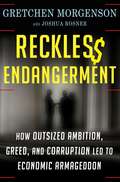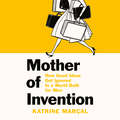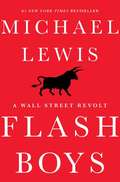Title search results
Showing 1 - 20 of 14292 items

Plutocrats: The rise of the new global super-rich and the fall of everyone else
By Chrystia Freeland. 2012
There has always been some gap between rich and poor in this country, but in the last few decades what…
it means to be rich has changed dramatically. Alarmingly, the greatest income gap is not between the 1 percent and the 99 percent, but within the wealthiest 1 percent of our nation-as the merely wealthy are left behind by the rapidly expanding fortunes of the new global super-rich. Forget the 1 percent; Plutocrats proves that it is the wealthiest 0.1 percent who are outpacing the rest of us at break-neck speed.What's changed is more than numbers. Today, most colossal fortunes are new, not inherited-amassed by perceptive businessmen who see themselves as deserving victors in a cut-throat international competition. As a transglobal class of successful professionals, today's self-made oligarchs often feel they have more in common with one another than with their countrymen back home. Bringing together the economics and psychology of these new super-rich, Plutocrats puts us inside a league very much of its own, with its own rules.The closest mirror to our own time is the late nineteenth century Gilded Age-the era of powerful 'robber barons' like Andrew Carnegie and John D. Rockefeller. Then as now, emerging markets and innovative technologies collided to produce unprecedented wealth for more people than ever in human history. Yet those at the very top benefited far more than others-and from this pinnacle they exercised immense and unchecked power in their countries. Today's closest analogue to these robber barons can be found in the turbulent economies of India, Brazil, and China, all home to ferocious market competition and political turmoil. But wealth, corruption, and populism are no longer constrained by national borders, so this new Gilded Age is already transforming the economics of the West as well. Plutocrats demonstrates how social upheavals generated by the first Gilded Age may pale in comparison to what is in store for us, as the wealth of the entire globalized world is concentrated in fewer and fewer hands.Cracking open the tight-knit world of the new global super-rich is Chrystia Freeland, an acclaimed business journalist who has spent nearly two decades reporting on the new transglobal elite. She parses an internal Citigroup memo that urges clients to design portfolios around the international "Plutonomy" and not the national "rest"; follows Russian, Mexican, and Indian oligarchs during the privatization boom as they manipulate the levers of power to commandeer their local economies; breaks down the gender divide between the vast female-managed 'middle class' and the world's one thousand billionaires; shows how, by controlling both the economic and political institutions of their nation, the richest members of China's National People's Congress have amassed more wealth than every branch of American government combined-the president, his cabinet, the justices of the Supreme Court, and both houses of Congress.Though the results can be shocking, Freeland dissects the lives of the world's wealthiest individuals with empathy, intelligence, and deep insight. Intelligently written, powerfully researched, and propelled by fascinating original interviews with the plutocrats themselves, Plutocrats is a tour-de-force of social and economic history, and the definitive examination of inequality in our time
From legendary investor Ray Dalio, author of the #1 New York Times bestseller Principles , who has spent half a…
century studying global economies and markets, Principles for Dealing with the Changing World Order examines history's most turbulent economic and political periods to reveal why the times ahead will likely be radically different from those we've experienced in our lifetimes—but similar to those that have happened many times before. A few years ago, Ray Dalio noticed a confluence of political and economic conditions he hadn't encountered before. They included huge debts and zero or near-zero interest rates that led to massive printing of money in the world's three major reserve currencies; big political and social conflicts within countries, especially the US, due to the largest wealth, political, and values disparities in more than 100 years; and the rising of a world power (China) to challenge the existing world power (US) and the existing world order. The last time that this confluence occurred was between 1930 and 1945. This realization sent Dalio on a search for the repeating patterns and cause/effect relationships underlying all major changes in wealth and power over the last 500 years. In this remarkable and timely addition to his Principles series, Dalio brings readers along for his study of the major empires—including the Dutch, the British, and the American—putting into perspective the "Big Cycle" that has driven the successes and failures of all the world's major countries throughout history. He reveals the timeless and universal forces behind these shifts and uses them to look into the future, offering practical principles for positioning oneself for what's ahead
The quest: energy, security and the remaking of the modern world
By Daniel Yergin. 2011
The author of the Pulitzer Prize-winning book The Prize: The Epic Quest for Oil, Money, and Power (DB 32424) examines…
the worldwide energy crisis. Investigates increasing energy demands, environmental concerns, and the development of alternative and renewable resources. Bestseller. 2011
Back to work: why we need smart government for a strong economy
By Bill Clinton. 2011
In the wake of the 2010 elections, former U.S. president Clinton explains his views of what has happened to America…
in the past thirty years and why our political system has not met the challenges facing our nation. Provides forty-six specific proposals to restore economic growth. Bestseller. 2011
The wealth cure: putting money in its place
By Hill Harper. 2011
Actor and author of Letters to a Young Brother (DB 62749) and Letters to a Young Sister (DB 70387) describes…
his cancer diagnosis, which led him to examine the meaning of happiness. Uses anecdotes to illustrate advice on building a financial foundation while resisting materialism. 2011
Confidence men: Wall Street, Washington, and the education of a president
By Ron Suskind. 2011
Pulitzer Prize-winning journalist explores President Obama's handling of the country's economic crisis. Covers Obama's 2008 election, his choice of advisers,…
the fight over a health-care plan, and the financial reforms his administration instituted. Portrays the Obama White House as often dysfunctional and in disarray. Some strong language. Bestseller. 2011
Reckles$ endangerment: how outsized ambition, greed, and corruption led to economic armageddon
By Gretchen Morgenson, Joshua Rosner. 2011
Pulitzer Prize-winning New York Times business journalist Morgenson and financial analyst Rosner investigate the 2008 financial meltdown. They assert that…
government regulators and public agencies were complicit in creating the circumstances for the economic crisis and name individuals they consider to be the key players. Bestseller. 2011
Mother of invention: How good ideas get ignored in an economy built for men
By Katrine Marçal. 2021
An illuminating and maddening examination of how gender bias has skewed innovation, technology, history and work.It all starts with a…
rolling suitcase. The wheel was invented some 5,000 years ago, and the modern suitcase in the mid-nineteenth century, but it wasn’t until the 1970s that someone successfully married the two. What was the hold up? For writer and journalist Katrine Marçal, the answer is both shocking and simple: because "real men" carried their bags, no matter how heavy. There were rolling suitcases before the '70s, but they were marketed as a niche product for (the presumably few) women travelling alone, and the wheeled suitcase wasn't "invented" until it was no longer threatening to masculinity. Mother of Invention draws on this example and many others, from electric cars to tech billionaires, to show how gender bias stifles the economy and holds us back. Our traditional notions about men and women have delayed innovations, sometimes by hundreds of years, and have distorted our understanding of our history. While we talk about the Iron Age and the Bronze Age, we might as well talk about the Ceramic Age or the Flax Age, since these technologies were just as important. But inventions associated with women are not considered to be technology in the same way. Katrine Marçal’s Mother of Invention is a fascinating examination of business, technology, and innovation through a feminist lens. Marçal takes us on a tour of the global economy, arguing that gendered assumptions dictate which businesses get funding, how we value work, and how we trace human progress. And it carries a powerful message: If we upend our biases, we can unleash our full potential, tackling climate change and wielding technology to become more human, rather than less.
Turning the tables: restaurants and the rise of the American middle class, 1880-1920
By Andrew P. Haley. 2011
Cultural historian examines connections between the development of American restaurants in the late nineteenth and early twentieth centuries and the…
evolution of the middle class. Discusses menus, service to women, and the gradual acceptance of various ethnic foods. 2011
Invisible women: data bias in a world designed for men
By Caroline Criado Perez. 2019
Examination of a root cause of gender inequality--the exclusion of women or preferential bias toward men in research data sets.…
Discusses the ways these biases play out in daily life, the workplace, product design, the doctor's office, and public life, and what happens when things go wrong. 2019
The year without a purchase: one family's quest to stop shopping and start connecting
By Scott Dannemiller. 2015
Blogger and former missionary chronicles the year he and his family chose to avoid buying things for a year. Discusses…
what brought his family to that point, the negotiations he and his wife made about the rules for acceptable purchases, and the impact on his family's relationship with God. 2015
Universal man: the lives of John Maynard Keynes
By Richard Davenport-Hines. 2015
Historian profiles the life of economist John Maynard Keynes (1883-1946) by segmenting his life into discrete parts: altruist, boy prodigy,…
official, public man, lover, connoisseur, and envoy. Discusses Keynes's bisexuality, interest in and patronage of the arts, and influence on twentieth-century economics. Some descriptions of sex. 2015
We have met the enemy: self-control in an age of excess
By Daniel Akst. 2011
Akst examines the many forms that excess takes in early twenty-first century America, such as overeating, overspending, and procrastination. Akst…
discusses the importance and challenge of willpower against the temptations he describes, and calls for individuals to exercise more control in their daily lives. 2011
Wildcat currency: how the virtual money revolution is transforming the economy
By Edward Castronova. 2014
Media and cognitive science professor discusses the concept of virtual money. Explains the history of private currencies--such as S&H Green…
Stamps--the legality of them, and the impact they may have on our economy. Poses questions for legislators to consider regarding economic policy in the twenty-first century. 2014
Saving capitalism: for the many, not the few
By Robert B. Reich. 2015
Former secretary of labor under President Bill Clinton examines the history of capitalism in the United States and the ways…
it has shifted in the last eighty years to most benefit only a small percentage of the population. Discusses the role of government in a capitalist society. 2015
The social climber's bible: a book of manners, practical tips, and spiritual advice for the upwardly mobile
By Dirk Wittenborn, Jazz Johnson. 2014
Wittenborn, author and producer of the Emmy-nominated documentary Born Rich, and his niece Johnson, an heir to the Johnson &…
Johnson fortune, humorously detail situations and appropriate responses for those who are aspiring to move up in the social strata. 2014
Excellent sheep: the miseducation of the American elite and the way to a meaningful life
By William Deresiewicz. 2014
Former Yale professor Deresiewicz, who served on the school's admission committee, addresses the school culture in the United States, which…
emphasizes perfect grades and test scores. Advocates the inclusion of humanities-based classes to encourage the development of critical-thinking skills. Bestseller. 2014
The fortunes of Africa: a 5000-year history of wealth, greed, and endeavour
By Martin Meredith. 2014
Journalist and historian explores the story of a continent--coveted in the past for its gold, ivory, and slaves, and in…
the modern era for oil, diamonds, and minerals--through its cultures, kingdoms, conflicts, and in the ambitions of global powers, from the Greeks onward. Some violence. 2014
Flash boys: a Wall Street revolt
By Michael Lewis. 2014
Author of The Blind Side (DB 63689) and Moneyball (DB 56245) relates the influence of high-frequency trades--made by computers in…
fractions of seconds--on financial markets. Chronicles the efforts of a group of men called the Flash Boys to limit the power of this practice. Strong language. Bestseller. 2014
The divide: American injustice in the age of the wealth gap
By Matt Taibbi, Molly Crabapple. 2014
Journalist examines the growing wealth disparity in the United States and how it affects the justice system. Taibbi asks why…
it appears that people with low incomes and few resources are more likely to be convicted of crimes, especially with much white-collar crime going unprosecuted. Bestseller. 2014